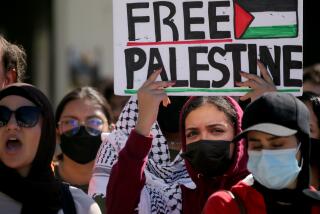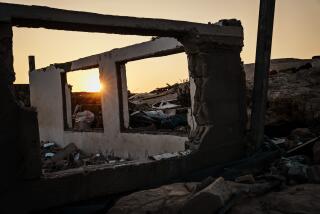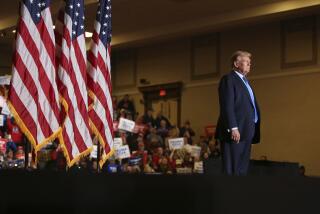Abderrahim Foukara, Al Jazeera’s U.S. translator
How do you convey to the world the American ideal of free speech or curious turns of phrase like “stump speech” and “gerrymandering”? Abderrahim Foukara does it daily, as Al Jazeera’s bureau chief in Washington. I first met the Moroccan-born journalist at the 2008 Republican convention, where he told me that he had explained John McCain as “maverick” to his Arab-language audiences as a bird that flies a distance from the flock. Now, at a parlous moment in the relationship between there and here, I asked the man who reports U.S. thinking to the Arab world to do some illuminating in the other direction.
What should Americans understand about the response to the “Innocence of the Muslims” video trailer?
[There are] peaceful protesters; [there is] the so-called silent majority. The violent protests may hark back to pure politics or ideology, which may include manipulation [by] groups or movements trying to settle scores with “ruling elites” in the Muslim world or the “West.”
There are people saying free speech is one thing but inciting hatred is another. You have to see the background. The Obama administration convinced Pastor Terry Jones [not to publicly burn the Koran]. Some people are saying that’s an example that the U.S. is eclectic in how it defines free speech.
Having said this, I admit that not for a long time have I had such a hard time understanding the real reasons behind a story. What I know for sure is that the protests are potentially of consequence to relations between the West and the Muslim world. It’s a silly, trashy trailer [eliciting] a reaction with potentially significant consequences.
For Al Jazeera, the challenge has been to reflect the feeling of the majority but not to show the demonstrations to be bigger than they actually are. The danger would be to film those protests as if they were the 1 million marches we had seen toppling Mubarak.
Is it frustrating for the foreign press corps that U.S. foreign policy plays such a small role in U.S. elections?
The U.S. is seen as a superpower. It controls land, it controls sea, it controls space; it has so many military bases around the world, particularly in the Mideast. People in the Middle East and North Africa think of foreign policy constantly, of U.S. foreign policy, and they find it baffling that the people who actually wield that influence are not so interested in foreign policy.
American insularity is partly a function of geography — size and isolation.
The United States is absolutely huge, and I can understand how some Americans can live all their lives without thinking of going overseas. Moving from one state to another is in some ways like moving from one country to another. Isolation was part of the security this country had; 9/11 shattered that. The Middle East has for thousands of years been the crossroads of empires and powers and civilizations. There’s obviously a much more heightened sense of history and geography; it’s been one empire after another. Partly because of geography, people in the Middle East they feel they’re almost constantly under attack, and have almost never had a fair shake at determining their own fates — there’s always [something] coming from the outside; whether you agree with that, that’s how they feel.
The U.S. is in the middle of election fever, and there’s fever in the Muslim world about these protests, but if we all step back and take a deep breath, I think both America and the Muslim world are in it together, with common challenges.
You got your start at the BBC. Is Al Jazeera’s journalism any different?
The fundamental principles are the same: You try to get the news from at least two different sources; you tell the story but stay out of it; you should not allow yourself to editorialize within your news story. [But] the BBC World Service reflects a certain British character: Your tone is restrained; you speak and deliver the news with a neutral voice that has nothing personal about it. Al Jazeera is a different tone. This is a channel from the Middle East. This is a turbulent part of the world; there’s a lot of angst, and in part, that’s why Al Jazeera has garnered the following it has [the Al Jazeera Network, including Al Jazeera English, claims an audience of 220 million households in 100 countries].
All the anger, the anxiety, the hope of the region find themselves expressed on Al Jazeera.
Are your reports ever blocked in the Arab countries you broadcast to?
Al Jazeera has had a problem with almost every Arab government across North Africa and the Middle East. It’s not very popular in Syria; the Syrians see us as a tool that supports the Syrian opposition. Until three years ago we didn’t have an office in Tunisia; it was shut down. We do not have an office in Algeria. Things got very testy at times with the government of Mubarak. Things are still testy; many Egyptians think Al Jazeera supports the Muslim Brotherhood, or the [other] side. The Iranian government accused Al Jazeera of inciting ethnic Arabs to revolt against the regime in Tehran and shut down the offices. When things began to heat up over the nuclear issue, they saw [they had] a vested interest in cooperation, so they allowed Al Jazeera to operate again.
Do you get the emails every reporter does, that every side thinks you’re on the other guys’ side?
I joined Al Jazeera barely a year after 9/11. It had a certain perception in the minds of many Americans because the tapes of Bin Laden were broadcast on Al Jazeera, because of Al Jazeera’s coverage of the war in Afghanistan. To many Americans it was seen in a negative way. But during the run-up to the invasion of Iraq in 2003, there were huge antiwar demonstrations in the U.S., and we covered those. People would come talk to us. “We want to tell your audience in the Arab world that not all Americans are for the invasion.”
Did some public figures not talk to you?
That happened, especially in the early days, with all sorts of people. Some were polite about it, some were very blunt: You’re Al Jazeera, I’m not going to talk to you.
Have you interviewed President Obama?
We are still trying. We are aware he may be worried that there may be criticism — “Why is he talking to Al Jazeera” — but he is the president, and he was willing to go to Cairo to deliver his speech about wanting a new page in relations with the Muslim world. If he takes a little flak talking to Al Jazeera, I’d hope he’d be willing to do it.
What differences do you see between U.S. and Arab-world audiences?
There is probably a better degree of knowledge in the Arab world of the United States than the other way around. Every election in the U.S., we provide hours of coverage; in 2008, I think we provided as many if not more hours of coverage than the American networks did.
We try to translate it to people in the Arab world: the electoral college; the gridlock; what are the implications? The U.S. Constitution — how come the U.S. has this document that was written by a bunch of middle-aged white guys [and] has survived in an America that is full of diversity now?
I don’t have scientific data to back this up, but I have a feeling that part of the reason [for the] changes in the Middle East and North Africa is the intensive coverage that Al Jazeera and other satellite channels have provided of elections in the U.S. and other democracies. I think the impact has been cumulative: people in the Arab world exposed to the notion that if you don’t like your president, you go to the polls and kick him out. I’m not suggesting that people say, “Oh, let’s emulate the American system.” I’m just saying it stimulates people to discuss their own political systems.
To explain “maverick” you used the metaphor of a bird straying from the flock. How do you make such things clear?
[It’s] one of the most fascinating aspects of the job, to translate something from one culture that does not exist in another culture. You have to find intellectual and emotive references to make people get it. The main thing is to convey the flavor of the concept, mechanism and institution.
You are something of a student of American history.
The history fascinates me: How this country has turned out over 400 years. Diversity — I’m very interested in how religious America is; people in North Africa and the Middle East assume this is a country built on money. Money is very, very important here, but it’s also a very religious place. When I first went to Boston, on the street where I lived there were no fewer than 10 or 15 churches, on a relatively short stretch of street. That came as a revelation.
How did you become a broadcast journalist?
My family listened to and watched the news a lot. At an early age I used to love pretending I was a radio announcer. Then I discovered BBC World Service when I was learning English. When I finished university in the U.K., it’s one of those things fate sometimes arranges: there was a BBC job ad and it looked tailor-made for me, someone who knew Africa and the Middle East and spoke certain languages.
When I joined the BBC [my family] were very excited. They started listening to the BBC Arabic Service even more assiduously. That saved some money because we [weren’t ] on the phone every day. They listened to my voice on the radio and they knew I was well!
Follow Patt Morrison on Twitter @pattmlatimes
This interview was edited and excerpted from a taped transcript. An archive of Morrison’s interviews can be found at latimes.com/pattasks.
More to Read
A cure for the common opinion
Get thought-provoking perspectives with our weekly newsletter.
You may occasionally receive promotional content from the Los Angeles Times.







